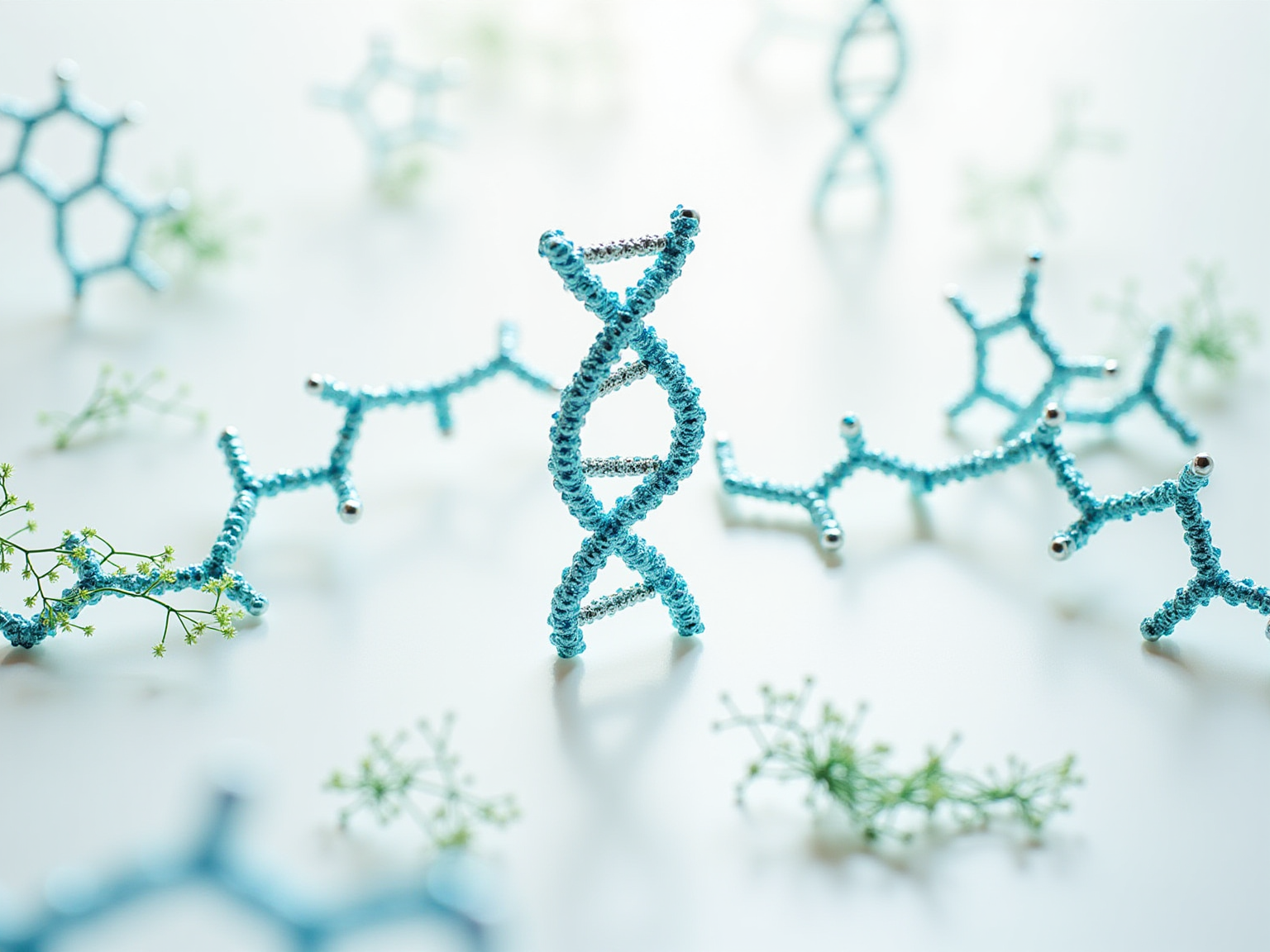Peptide Explained: Understanding Their Role in Health and Aging
Overview
Peptides are vital in health and aging, influencing key biological processes such as hormone regulation, immune response, and tissue repair, all of which are essential for maintaining overall well-being. Studies indicate that specific peptides can enhance muscle growth, improve metabolic health, and mitigate signs of aging. This positions peptides as significant contributors to longevity and health optimization.
Furthermore, understanding the impact of peptides can lead to actionable insights for enhancing health. For instance, incorporating peptides into your wellness regimen may offer numerous benefits, including improved physical performance and a more youthful appearance. As a result, exploring the potential of peptides could be a valuable step towards optimizing your health and longevity.
Introduction
Peptides, often overshadowed by their larger protein counterparts, are emerging as key players in the realms of health and aging. These short chains of amino acids, ranging from just two to fifty, are not only fundamental to various biological processes but also hold immense therapeutic potential. From regulating hormones and enhancing muscle growth to promoting skin elasticity, peptides are making waves in both medical and nutritional fields.
Recent studies underscore their significance in extending healthspan. Innovative therapies and dietary practices—like those of the longevity-focused Hunza people—showcase how these biomolecules can transform wellness approaches. As research continues to unveil the multifaceted roles of peptides, the spotlight is increasingly on how they can be harnessed to optimize health and combat the effects of aging.
Defining Peptides: Structure and Function
Peptides are brief sequences of amino acids, typically consisting of 2 to 50 amino acids connected by bonds. They fall into two primary categories: oligopeptides, which are shorter chains, and polypeptides, which are longer. These biomolecules play a vital role in numerous biological processes, including hormone regulation, immune response, and cellular signaling. For instance, insulin, a well-known protein hormone, is crucial for controlling blood sugar levels, while other proteins contribute to muscle development and recovery.
Recent studies emphasize the significance of proteins in sustaining well-being and promoting longevity. In 2025, research indicates that these compounds are essential for various physiological functions, which has significant implications for aging. Data shows that small proteins can influence hormone regulation, with certain ones linked to improved muscle growth and metabolic health. Notably, the Hunza community, recognized for their extraordinary lifespan, often credits their well-being to a diet rich in high-quality animal products, aligning with the benefits of peptide-rich nutrition.
Case studies have demonstrated the efficacy of protein treatments in clinical settings, showcasing their ability to enhance health outcomes. For example, growth hormone-releasing peptides (GHRPs) have been shown to stimulate the release of growth hormone, which is essential for muscle development and overall vitality. The concept of peptide explained is crucial for understanding their structure and role, which is essential for recognizing their broader significance in health and longevity, positioning them as a central topic in contemporary wellness discussions. By integrating innovative therapies and quality nutrition—such as those inspired by the dietary habits of the Hunza—individuals can enhance their approach to maintaining health.
The Role of Peptides in Health and Aging
The potential benefits of peptides in health and longevity are often peptide explained. The role of these molecules as signaling agents that regulate various physiological processes, such as metabolism, immune response, and tissue repair, is often peptide explained. For instance, specific proteins, including collagen derivatives, are known to enhance skin elasticity and moisture, effectively countering signs of aging. Furthermore, compounds like BPC-157 have shown promise in promoting healing and reducing inflammation.
Studies indicate that dietary proteins can influence aging-related pathways, such as mTOR and AMPK, suggesting they may play a role in extending the duration of well-being—the period of life spent in optimal health. Moreover, research conducted by Dr. Dituri in underwater environments reveals that prolonged exposure to submerged settings might amplify the effects of these compounds, potentially leading to innovative anti-aging strategies.
By combining protein therapy with lifestyle changes, such as those explored in underwater studies, we can gain valuable insights into enhancing health and longevity. How might these findings shape our approach to well-being? This intersection of science and lifestyle offers exciting possibilities for the future.
Historical Context and Advances in Peptide Research
The examination of protein fragments has its roots in the early 20th century, with significant advancements unfolding over the decades. Emil Fischer, a pioneer in protein chemistry, synthesized the first compounds, laying the groundwork for our understanding of their structure and function. The introduction of insulin treatment in the 1920s marked a pivotal moment in protein-based medicine, showcasing their potential in healthcare. Since then, research has expanded to explore various applications of proteins, including their roles in anti-aging treatments and nutritional supplements.
Recent innovations in protein synthesis and delivery techniques have further enhanced their therapeutic potential, positioning them as a focal point in health and wellness research. As we delve into anti-aging approaches, it is crucial to consider the importance of quality nutrition, particularly the inclusion of animal-based foods, which can amplify the effects of treatments as peptide explained. ByKomi emphasizes the significance of dietary supplements and novel treatments, such as their unique formulations that promote healthy longevity, aligning with the growing evidence supporting their effectiveness in enhancing lifespan and overall wellness.
Moreover, the dietary practices of the Hunza people, renowned for their longevity, underscore the benefits of quality nutrition in anti-aging. This reinforces ByKomi’s commitment to empowering healthy aging through nutrition and innovative therapies. How can we leverage these insights to improve our own health? The answer lies in understanding the intersection of nutrition and the concept of peptide explained within protein science.
Applications of Peptides: From Therapeutics to Nutrition
The role of peptides is crucial in various applications, as peptide explained includes therapeutic uses in medicine and enhancements in dietary supplements. In the medical field, the role of peptide explained compounds is vital in addressing conditions like diabetes, obesity, and age-related illnesses. Notably, peptide explained medications such as GLP-1 receptor agonists have shown significant efficacy in regulating blood sugar levels and facilitating weight loss. Recent studies indicate that tri-agonists outperform dual-agonists and mono-agonists, achieving average weight reductions of 24.15 kg, 11.07 kg, and 7.03 kg, respectively, over 52 weeks. However, it is important to note that the study examined a commercially insured membership and therefore may not be generalizable to Medicare or Medicaid populations or individuals paying out of pocket.
In the realm of skincare, the benefits of peptide explained compounds are renowned for their anti-aging properties, effectively stimulating collagen production and enhancing skin texture. Additionally, dietary proteins derived from animal-based sources aid in enhanced nutrient absorption and muscle recovery, rendering them vital for individuals seeking to optimize their well-being and longevity. My personal experience with Dr. Alan Green, a pioneer in prescribing Rapamycin for anti-aging, has highlighted the significance of innovative treatments in this journey. After discussing with him, I discovered how Rapamycin can enhance protein treatments in promoting longevity and overall well-being.
For those interested in exploring similar therapies, booking an appointment with Dr. Alan Green can be done through his website, where you can find detailed instructions on the process. During my consultation, Dr. Green performed a full physical examination, reviewed my blood lab results, and provided a one-year prescription for Rapamycin, along with guidance on potential side effects and management strategies.
ByKomi.com highlights these diverse applications, equipping readers with valuable insights on how to incorporate peptides into their health and wellness routines, with the concept of peptide explained, ultimately supporting their journey toward healthier aging. The findings are further contextualized by the case study titled “Comparison of GLP-1 RAs: Semaglutide vs. Tirzepatide,” which underscores the efficacy and safety profiles of different GLP-1 receptor agonists.
Conclusion
Peptides are rapidly gaining recognition as vital components in the pursuit of health and longevity. Their unique structures and functions allow them to influence various biological processes—ranging from hormone regulation to enhancing skin elasticity and promoting muscle recovery. As highlighted throughout this article, peptides play an essential role in therapeutic applications, showcasing their potential to address age-related conditions and improve overall well-being.
The insights drawn from the Hunza people’s dietary practices, along with the integration of peptide therapies, underscore the importance of nutrition in optimizing healthspan. Furthermore, the connection between peptides and aging is supported by ongoing research that explores how these biomolecules can extend the period of life spent in good health. With advancements in peptide synthesis and delivery methods, the therapeutic possibilities appear limitless, promising innovative approaches to wellness and anti-aging strategies.
Ultimately, as more individuals become aware of the benefits peptides offer, incorporating them into both therapeutic and nutritional practices can lead to a transformative impact on health and aging. Embracing a holistic approach that combines quality nutrition with peptide therapies presents a compelling pathway to enhance vitality and longevity. The future of health optimization lies in harnessing the power of peptides, paving the way for a healthier, more vibrant life.
Frequently Asked Questions
What are peptides?
Peptides are brief sequences of amino acids, typically consisting of 2 to 50 amino acids connected by bonds.
What are the two primary categories of peptides?
The two primary categories of peptides are oligopeptides, which are shorter chains, and polypeptides, which are longer chains.
What roles do peptides play in biological processes?
Peptides play vital roles in numerous biological processes, including hormone regulation, immune response, and cellular signaling.
Can you provide an example of a peptide and its function?
Insulin is an example of a peptide that is crucial for controlling blood sugar levels, while other proteins contribute to muscle development and recovery.
What recent studies indicate about proteins and well-being?
Recent studies emphasize the significance of proteins in sustaining well-being and promoting longevity, indicating their essential role in various physiological functions.
How do small proteins influence health?
Data shows that small proteins can influence hormone regulation and are linked to improved muscle growth and metabolic health.
What is notable about the Hunza community in relation to peptides?
The Hunza community, recognized for their extraordinary lifespan, often credits their well-being to a diet rich in high-quality animal products, which aligns with the benefits of peptide-rich nutrition.
What have case studies shown about protein treatments?
Case studies have demonstrated the efficacy of protein treatments in clinical settings, showcasing their ability to enhance health outcomes.
What are growth hormone-releasing peptides (GHRPs)?
Growth hormone-releasing peptides (GHRPs) are peptides that stimulate the release of growth hormone, which is essential for muscle development and overall vitality.
Why is understanding peptides important in contemporary wellness discussions?
Understanding peptides is crucial for recognizing their structure and role, which is essential for acknowledging their broader significance in health and longevity.






